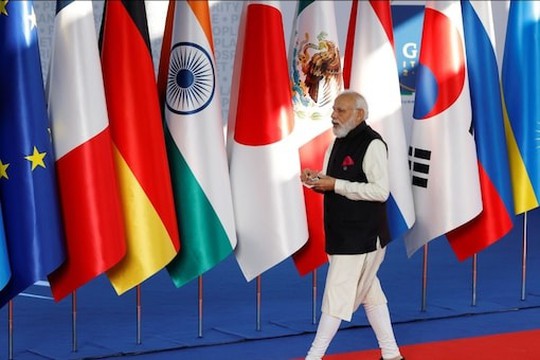The Prime Minister of India Narendra Modi
India’s strategic autonomy is rooted in the concept of multipolarity that it sees as necessary for a more balanced international system. We see multipolarity as a reform of the present system, not its break-up, writes Kanwal Sibal, a former Indian Foreign Secretary, India’s Ambassador to Turkey, Egypt, France and Russia.
French President Emmanuel Macron has stirred a hornet’s nest in the US, UK, as well as in the EU by talking of Europe’s strategic autonomy in an interview with journalists in the course of his recent visit to China in which he spoke against the US exacerbating the Taiwan issue, China over-reacting and Europe having to follow the American pace. Speaking later in the Netherlands Macron reiterated this view, while also stating that both France and Europe support the status quo in Taiwan.
France and India share the concept of strategic autonomy, though France is a member of the transatlantic alliance and India has always remained outside any alliance system as a matter of principle.
France, as a permanent member of the Security Council, a nuclear weapon state, with autonomous military and space capabilities, can seek to play an international role that is not entirely limited by its alliance obligations, though the need to have a voice within the alliance, avoid ruffling the US beyond a point, and preserve its influence within a 27-member European Union with all its disparate internal pulls and pressures limits its overall capacity to manoeuvre. Europe has economic muscle, though there too it is forced to adhere to US-dictated sanctions even when the interests of its companies suffer, and submit to the extra-territorial application of US laws under protest. But lacking military muscle makes Europe subservient to the US on defence and security issues.
Interestingly, Charles Michel, head of the European Council, stated on April 11 that Macron’s position on strategic autonomy, to wit, that Europe should resist pressure to become America’s followers, was not isolated among EU leaders, and that “on the issue of relationship with the United States, it is clear that there can be nuances and sensitivities around the table of the European Council” and that even if they wouldn’t say things the same way that Macron did, “quite a few really think like Emmanuel Macron”. Michel has gone on to say that if “this alliance with the United States would suppose that we blindly, systematically follow the position of the United States on all issues, no.” Hungary in Europe is exercising its strategic autonomy quite aggressively in response to US and EU’s policies on sanctions and ties with Russia that it feels are highly injurious to its national interest.
Those at home who scoff at India wanting to exercise its strategic autonomy should reflect on trends in Europe despite the transatlantic alliance. If within Europe there is resistance to become America’s followers despite the strong political, economic and security bonds it has with the US, India, while strengthening its strategic ties with the US politically, economically and in the security domain, can legitimately seek to keep its options open to act on issues based on its national interest rather than US geopolitical preferences.
India has therefore rightly resisted pressure by both the US and Europe to side with them over the Ukraine conflict against Russia when it is not in our national interest to do so, and when our objective reading of the rights and wrongs of the issues involved is different to that of the West. (It is ironic though that while Europe wants to maintain its strategic autonomy by not following the US on issues that do not conform to European interests, it has, on Russia, been pressing us to go against our objective national interest and subscribe to the approach of the West).
On the Ukraine crisis, India has stood its ground on its ties with Russia, rejecting false moral arguments and puerile advice on being on the right side of history.
Our membership of the SCO — we chair it currently and will hold the summit this year — and BRICS, which is attracting membership bids from many countries- remains important in our strategy of leveraging all international platforms for our political, security and developmental needs.
At the same time, we are deepening our cooperation within QUAD, strengthening trade and technological ties with the West, expanding our ties with Japan and participating in G7 meetings. We are currently chairing the G20 and marking its discussions with our priorities and those of the Global South.
Our strategic autonomy is rooted in the concept of multipolarity that we see as necessary for a more balanced international system. We see multipolarity as a reform of the present system, not its break-up. We see it as necessary to give more voice to developing countries in international political, economic and financial governance, favour more collective understandings on addressing the many challenges facing the international community as a whole, and of course, as a buffer against any form of unilateralism, Kanwal Sibal stresses.
read more in our Telegram-channel https://t.me/The_International_Affairs

 10:00 24.04.2023 •
10:00 24.04.2023 •























